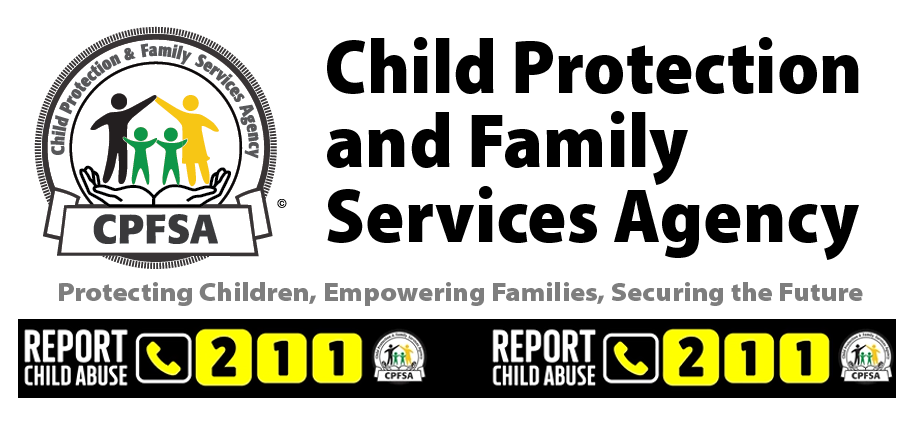Facebook
Twitter
Instagram
Youtube
The Children’s Advisory Panel
In order to uphold child rights and properly carry out its role of child protection in Jamaica, the Child Protection and Family Services Agency (CPFSA) is actively encouraging the participation of children in decision-making within the organisation.
Article 12 of the United Nations Convention on the Rights of the Child recognizes the right of children to be heard in all matters that affect them. Furthermore, the Child Care and Protection Act underscores that it is in a child’s best interest that their views are taken seriously.
As part of its belief that consulting with children and incorporating their views into its programmes, plans and polices will create a better society, the CPFSA is now establishing a Children’s Advisory Panel as one of the means to promote and facilitate child participation
Who will be on the Children’s Advisory Panel?
Selection of the Children’s Advisory Panel
How will the Children’s Advisory Panel Function?
What Issues are to be handled by the Advisory Panel?
The Responsibilities of Panel Members
Responsibilities of the Advisors to the Panel
What Material does the Children’s Advisory Panel Need?
Informed Consent and Permission from Parents / Other Key Adults:
The Operation of the Panel in the Best Interest of the Child
Who will be on the Children’s Advisory Panel?
The Children’s Advisory Panel is a group of Jamaican youngsters convened to discuss ongoing and emerging policy issues that affect children and their families, and who will provide child-friendly guidance so that the best interest of children is promoted in CPFSA’s decision-making.
The Panel will comprise no more than 20 young persons between the ages of 12 and 18. In order to represent a wide viewpoint, a mix of children will form the make up of the panel.
Selection of the Children’s Advisory Panel
The CPFSA will select persons for the Panel through asking:
- CPFSA regions, child-centered organization, schools or other relevant organizations to recommend a nominee
How will the Children’s Advisory Panel Function?
The members of the Panel shall nominate among themselves persons to serve as Chairperson, Vice-Chairperson, General Secretary and Deputy General Secretary.
What Issues are to be handled by the Advisory Panel?
The Panel will provide advice to the CPFSA’s Chief Executive Officer, Executive Management Team and Advisory Board on a wide variety of issues which include:
> National Policies that affect children
> Planning and budgeting for children
> Programme design and development
> International and national initiatives
> New and emerging issues of interest to children
> When called upon to do so, the Panel may also:
> Work with the CPFSA to plan and host conferences
> Develop materials to share with children
> Facilitate child engagement activities.
The Responsibilities of Panel Members
Children who serve on the CPFSA children panel have the following responsibilities:
- 1. Attending Panel meetings to be held quarterly
- 2. Contribute to the Panel’s activities
- 3. Keep information confidential when necessary
- 4. Be aware of current affairs
- 5. Ask for support when necessary
- 6. Communicate to Advisor(s) if there are concerns on any matter
Expectations and Values of Panel Members:
> Show respect at all times to peers and others
> Being on time and well attired
> Share only information that is not confidential with others
Responsibilities of the Advisors to the Panel
- > Serve as mentor and consultant to Panel
- > Provide support for Panel’s activities and attend meetings on the Panel’s request
- > Identify training needs and make recommendations on actions to be taken
- > Assist the Panel with plans and resource materials
What Material does the Children’s Advisory Panel Need?
The children selected for the Children’s Advisory Panel will be exposed to:
- > The Convention on the Rights of the Child
- > Jamaica’s most recent report to the Committee on the Rights of the Child
- > The Child Care and Protection Act, 2004
- > Policy and legislation that affect children
- > National Framework of Action for Children
- > Child Participation Protocol
- > Children’s Advisory Panel Handbook
- > CPFSA Corporate Strategic Plan
Training will be provided to enhance children’s skills and knowledge. This will contribute to members of the Panel carrying out their duties and responsibilities more effectively and making more informed decisions.
Informed Consent and Permission from Parents / Other Key Adults:
Permission from parents, caregivers, and schools will also be gained in advance, so that family members or other key adults can actively support children’s participation.
The children who are invited to be part of the CPFSA Children’s Advisory Panel are required to complete an application form, along with a parental consent form which needs to be returned to the CPFSA, prior to them being accepted on the Panel.
The Operation of the Panel in the Best Interest of the Child
The operation of the Panel will be carried out in the best interest of the child. As it relates to time considerations, panel activities will be organised so as not to interfere with children’s study or other important responsibilities.
Children will have the opportunity to decide meeting times which can be during week days, week-ends, school holidays, or after school hours so that they do not have to miss school to actively participate.
From time to time, permission will also to be sought from school authorities to conduct meetings with children during school hours.
Children’s safety is a priority and this will be taken into consideration for transportation, timing of events and as it relates to all other aspects of the panel’s operations.
The Term Limits of the Panel
Panel members are only allowed to serve a two-year term, and are expected to contribute meaningfully to the group. However, those who are members of the inaugural Children’s Advisory Panel who become 18 in their first year of serving shall continue to until the last day of their 18th birthday.
